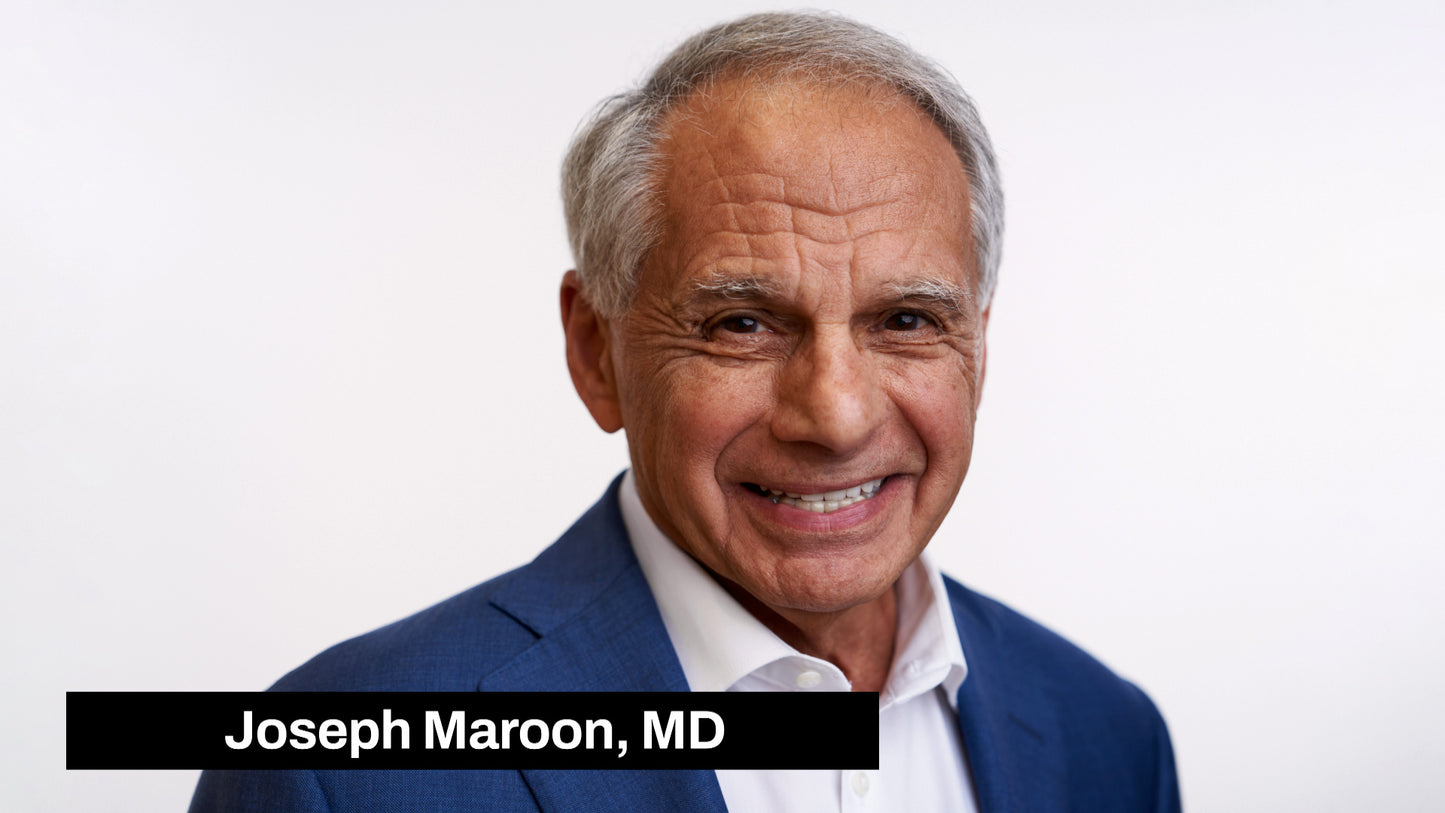7 Neurosurgeon-Recommended Longevity Supplements

How Dr. Joseph Maroon Uses Supplements for Lifelong Vitality at 84
When life handed Dr. Joseph Maroon an unimaginable series of events—his father's sudden death at 60 from a heart attack, a painful divorce, and an inevitable halt in his successful neurosurgery career—he found himself at a truck stop in West Virginia, flipping burgers and filling gas in 18-wheelers. Overwhelmed by depression and grappling with his weight, Dr. Maroon stepped away from neurosurgery for a year, until making a remarkable comeback.
Dr. Maroon found a new beginning through the simple act of running, which eventually lead him to participate in triathlons and Ironman® races. It’s never too late to start.
He was 42 when he learned how to swim. Those feats not only helped restore his physical well-being but also set him on a new path to longevity.
Now at 84, Dr. Maroon lives by the ethos to “seize the day” and “try to die young as late as possible.”
He shared his strategic longevity supplement stack with us that optimizes his health and fights the aging process.
Doctor-Recommended Longevity Supplements
NMN + TMG
There’s a reason Dr. Maroon takes these two ingredients together. NMN (Nicotinamide Mononucleotide) is a precursor to NAD+, an essential molecule to life that participates in more than 50% of all physiological processes, including mitochondrial biogenesis, cardiovascular health, neurological health, and DNA repair.*
Many longevity experts recommend combining trimethyl glycine (TMG) with NMN for a very good reason. NMN supplementation can be optimized by adding methyl donors such as TMG. This not only supports healthy NAD+ metabolism but also helps maintain the pool of methyl groups needed for other vital processes. Furthermore, TMG helps maintain healthy homocysteine levels, thereby supporting cardiovascular health.*¹
Learn more about NMN Pro™ Complete.
Magnesium L-Threonate (Brain-Mag)
Magtein®, the form of magnesium in ProHealth's Brain-Mag, is the only form of magnesium that has been clinically evaluated to boost magnesium levels in the brain.*
This is because Magtein® crosses the blood-brain barrier.
This form of magnesium L-threonate may also facilitate learning and memory, as well as a relaxed mood.*¹
Resveratrol
This molecule has been part of the anti-aging conversion for decades, and now we have extensive data showing that its health benefit reaches far beyond neutralizing free radicals.*
Resveratrol has been found to address several of the 12 hallmarks of aging, including eliminating senescent “zombie” cells, boosting mitochondrial function, supporting healthy DNA, maintaining telomere length, and activating SIRT1, a “longevity gene” key to maintaining a youthful mind and body.*
Learn more about Resveratrol.
CoQ10
Coenzyme Q10 plays a critical role in combating oxidative stress and supporting cellular energy production. However, after our mid-20s, coQ10 naturally starts to decline, and food sources may not be sufficient in replenishing those levels.²
As a potent free radical scavenger, researchers have found that CoQ10 helps maintain a healthy heart and vascular system.*³
Curcumin
Dr. Maroon told us that many human clinical trials support the efficacy of curcumin, the active compound in turmeric. He specifically highlighted its ability to support cognitive function, joint health, and healthy inflammatory status.⁴
To maximize bioavailability, ProHealth’s Optimized Curcumin uses an advanced form of turmeric to deliver free curcumin to the bloodstream and tissues.*
Omega-3 Fatty Acids
Can you guess what the omega-6 / omega-3 fatty acid ratio of humans was a century ago and what it is today?⁵
The difference is over 5-fold!
A healthy ratio is 4:1 or less, yet current data reports that the Western diet provides an approximately 20:1 ratio in favor of omega-6 fatty acids.⁶
The sources of omega-6 polyunsaturated fatty acids are mainly seed oils, which have significantly increased in our modern world. Corn and safflower oil for example have an omega-6 to omega-3 ratio of approximately 60:1 and 77:1, respectively.
Achieving a more optimal ratio has been found to support a healthy inflammatory response and help optimize heart and brain health.*
The Prohealth Longevity Krill Oil supplies highly concentrated omega-3 fatty acids, with naturally occurring phospholipids and astaxanthin.
-
Sharma A et al. Nutrients. 2023; 15(2):445.
- Kalén A et al. Lipids. 1989; 24(7):579-584.
- Barcelos IP et al. Biology (Basel). 2019; 8(2):28.
- Cox KHM et al. Nutrients. 2020; 12(6):1678.
- Simopoulos AP. Biomed Pharmacother. 2002; 56(8):365-379.
- DiNicolantonio JJ et al. Mo Med. 2021;118(5):453-459.





